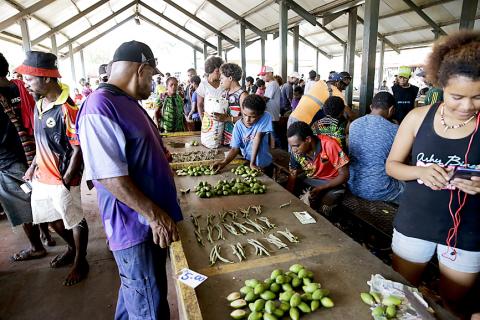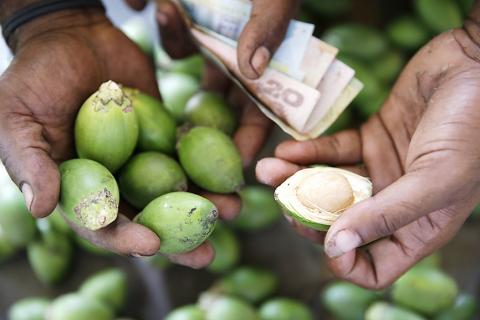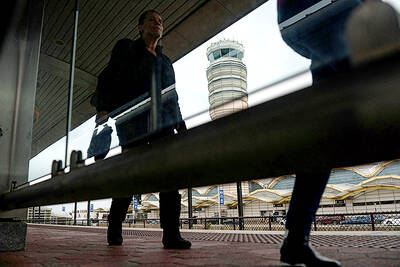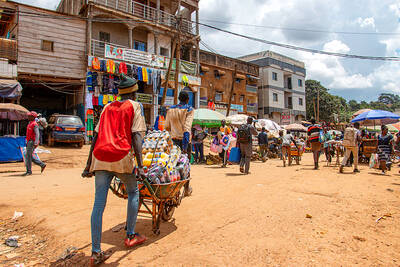A ubiquitous sight in Papua New Guinea’s (PNG) capital is men, women and children chewing betel nut combined with slaked lime and mustard bean, turning lips, teeth and tongue a dark red, and producing a mild high.
Along with drinking alcohol in public, chewing betel nut and spitting out the messy remains has been aggressively discouraged in Port Moresby this year. It is part attempt to clean up the coastal city of 300,000 as world leaders briefly descended on it for a Pacific Rim summit this weekend and part the latest episode of an ongoing struggle to control betel nut after previous attempts to completely ban it in the city caused chaos.
Papua New Guinean Prime Minister Peter O’Neill wants the nation, one of the least urbanized countries in the world, to present its best face for the APEC meeting. Faces with red lips and stained teeth are not part of that vision.

Photo: AP
At the Koki Buai market, more than two dozen vendors laid out mounds of the green betel palm fruit and small piles of mustard beans as an excited crowd was kept under control by threats and admonishments from heavies, some wielding bits of wood, employed to keep order.
“I’m happy that APEC has come to PNG and I’m happy the leaders are here, everyone from other countries,” vendor Rodney Pupu said. “I want to welcome all of you.”
The market is one of several set up in Port Moresby over the past several years as a compromise that allows the trade in “green gold” to continue.

Photo: AP
Chewing betel nut has deep cultural roots in Papua New Guinea’s tribal societies, but in the capital has morphed into addiction and lucrative business.
Medical experts says prolonged use causes oral cancer.
A total ban imposed in Port Moresby in 2013 spiraled into conflict that caused deaths and property damage, and deprived thousands of people of livelihoods, development economist Busa Jeremiah Wenogo wrote in a blog.
Another total ban was threatened earlier this year, but was wound back after tear gas fired by police to disperse vendors drifted into a school, Wenogo said.
There were also allegations police stripped vendors naked as a form of punishment.
The current solution — designated markets — also has its problems because of cramped conditions and confrontations between rival factions, he said.
At Koki Buai, handfuls of the fruit were selling for 2 to 5 kina (US$0.60 to US$1.50) and mustard beans for 1 to 2 kina.
Pupu said he can make 1,000 kina in a week and double that if a rugby union or rugby league match — a national obsession — is happening in the town.
Before the market, which some of the vendors credited the minister for APEC Justin Tkatchenko with setting up, Pupu said selling was a cat-and-mouse game with police.
Asked if he was concerned about the high cost of hosting the summit and controversies such as the import of 40 luxury Maserati cars to transport VIPs, Pupu deferred to the market’s boss, a feisty woman hovering nearby.
Another man, John Simage, interjected.
“I strongly disagree that the government decided to take so much money and buy the Maseratis when we actually have cars in Papua New Guinea that we could use to transport delegates,” he said. “We could have saved that money to bring further development to the country.”
What is been called Papua New Guinea’s global coming-out party has caused both pride and discord and underlined the yawning gulf between a small well-educated minority and poor people, who include the 85 percent of people living in the highlands and other remote areas.
City social services worker Tony Sari said the country needs development, but also acknowledged that the summit expenses were unpopular outside the capital, where basic public services such as health and education are limited.
“It’s like living. You have good days and bad days,” he said.
It was clear that the overhaul of Port Moresby has made an impact, Sari said.
When he travels in his National Capital District Commission vehicle, people sometimes shout “APEC, APEC,” he said, amused to find himself getting credit.
At a busy supermarket, 21-year-old grocery bagger Catherine Lapsie said she was “really happy” that her country was getting attention.
The restrictions on public drinking and betel nut chewing could change behavior for the better, she said, but added that she was also afraid of what might happen once the foreign dignitaries leave.
“I feel something terrible will happen,” she said.
“They said after the APEC meeting, something will go on,” Lapsie said, grimacing while trying to explain her fears in English.
Switching to a local language, she said that more tourists might come and prices increase, making life more difficult for ordinary Papua New Guineans.

FRUSTRATIONS: One in seven youths in China and Indonesia are unemployed, and many in the region are stuck in low-productivity jobs, the World Bank said Young people across Asia are struggling to find good jobs, with many stuck in low-productivity work that the World Bank said could strain social stability as frustrations fuel a global wave of youth-led protests. The bank highlighted a persistent gap between younger and more experienced workers across several Asian economies in a regional economic update released yesterday, noting that one in seven young people in China and Indonesia are unemployed. The share of people now vulnerable to falling into poverty is now larger than the middle class in most countries, it said. “The employment rate is generally high, but the young struggle to

ENERGY SHIFT: A report by Ember suggests it is possible for the world to wean off polluting sources of power, such as coal and gas, even as demand for electricity surges Worldwide solar and wind power generation has outpaced electricity demand this year, and for the first time on record, renewable energies combined generated more power than coal, a new analysis said. Global solar generation grew by a record 31 percent in the first half of the year, while wind generation grew 7.7 percent, according to the report by the energy think tank Ember, which was released after midnight yesterday. Solar and wind generation combined grew by more than 400 terawatt hours, which was more than the increase in overall global demand during the same period, it said. The findings suggest it is

IN THE AIR: With no compromise on the budget in sight, more air traffic controllers are calling in sick, which has led to an estimated 13,000 flight delays, the FAA said Concerns over flight delays and missed paychecks due to the US government shutdown escalated on Wednesday, as senators rejected yet another bid to end the standoff. Democrats voted for a sixth time to block a Republican stopgap funding measure to reopen government departments, keeping much of the federal workforce home or working without pay. With the shutdown in its eighth day, lines at airports were expected to grow amid increased absenteeism among security and safety staff at some of the country’s busiest hubs. Air traffic controllers — seen as “essential” public servants — are kept at work during government shutdowns, but higher numbers

Elvis Nghobo tried to get into four different professional schools in Cameroon, but could not make it. Frustrated, the 34-year-old turned to selling food at a market in Yaounde, the country’s seat of power. Nghobo blames his woes on what he calls a corrupt education system that favors children of the elite. As the central African country prepares for Sunday’s presidential election, he said he would not be heading out to vote. He called the results a foregone conclusion for 92-year-old Paul Biya, the world’s oldest president, who has ruled for Nghobo’s entire life. “He is already too old to govern, and it’s boring